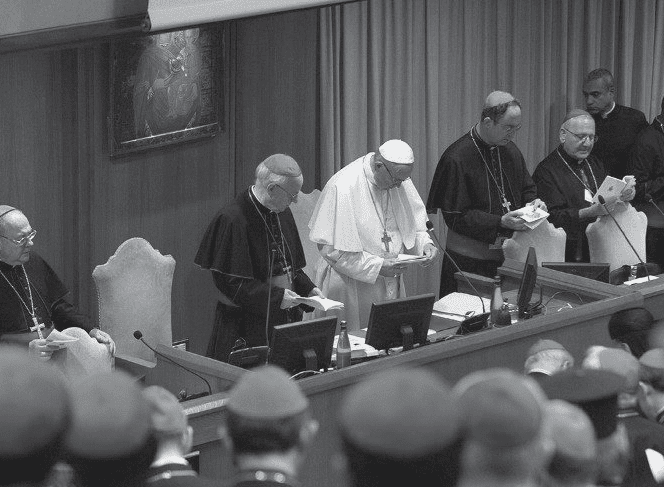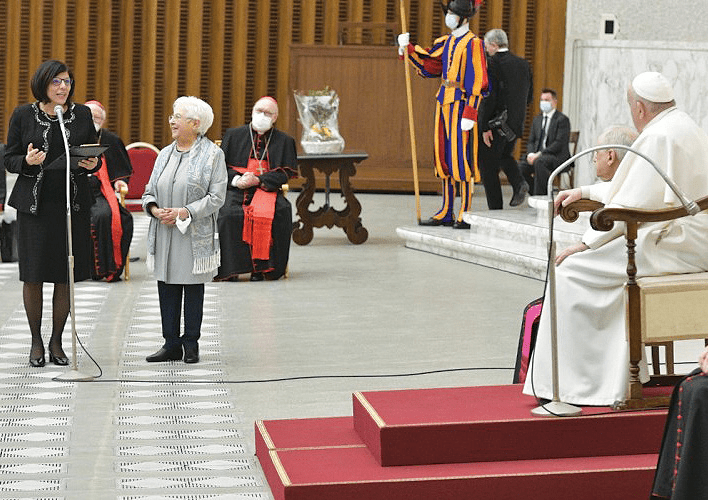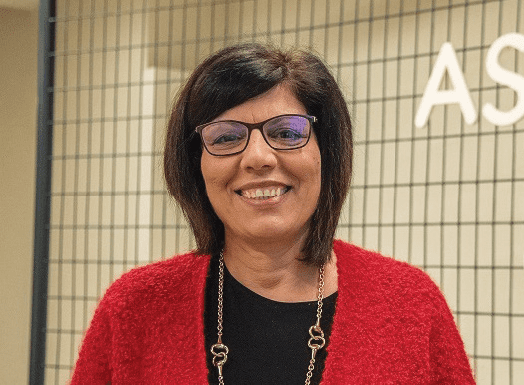I came across one of Chiara Lubich’s writings when she was called by St. Pope John Paul II to participate as an auditor at the 1999 Synod. This is how Chiara appealed to the family of the Focolare in the world to live this event with her:
“What should we commit ourselves to? How can we play our part? By renewing frequently in our hearts the serious intention of always desiring, night and day, the presence of Jesus among us, and by acting accordingly.
“In fact, [such a desire] is an act that calls for sacrifice. It requires, for example, overcoming human respect, overcoming laziness, practicing humility to silence self-love, in short, paying the price of a communitarian spirituality…

“Reminding each other of the duty of having Jesus among us can contribute to living on a supernatural level… This way of doing things, this keeping the level of our spiritual life high, is our characteristic contribution to the synod, as well as to the Holy Journey that these conference calls help us to undertake.”
From the beginning, the path of the Movement developed in a way that we can call “synodal,” because the rediscovery of God as love — the “inspirational spark,” as John Paul II called it — opened a way to go to God together.
The two main cornerstones of the spirituality that accompanied this development are: unity and Jesus Forsaken.
Unity. It was around 1946 when Chiara Lubich and her companions, who were already committed to living the Gospel, read the testament of Jesus together. Those difficult words became clear, one by one: “That they may be one as we are one,” “That they may all be one” (Jn 17:21).
It was the discovery of God’s plan for humanity. Chiara perceived the profound reality of the relationship between the Father and the Son, and the greatness of that relationship being communicated to us.
And this desire of Jesus is translated into a firm commitment: “We were born for this page.”
This gives rise to a responsibility that was primarily personal: that of living the Word in our daily lives to conform ourselves to being “another Jesus… To act ‘like Jesus’ on earth.”
It is a commitment, however, that is not only personal but also collective, and which recalls the New Commandment, to love one another as he has loved us (Jn 15:12).
She continues, “We, companions, looked at one other and began to love one another to fulfill this will of God which comes particularly from Jesus.”
This led to a common decision, marked by a pact of mutual love, consciously and solemnly made, to be renewed often and with confidence, especially in front of any lack of charity.
The other cornerstone is the discovery of Jesus Forsaken. Even before focusing on the passage in John 17, Chiara and her companions had “discovered” Jesus’ cry of forsakenness on the cross (see Mt 27:46).
They understood it as the experience of his greatest suffering: experiencing being abandoned, he who had said: “I and the Father are one” (Jn 10:29–30). It was a culmination of suffering in which the greatness of his love is revealed, bearing fruit in our redemption, reuniting a torn and divided humanity to God.
He is the key to unity with God, therefore, and the key to the unity of people among themselves…
Jesus Forsaken and unity are two sides of the same coin, and those who want to live in unity and for unity “can only go ahead by leaning on a suffering-love as strong as that of Jesus crucified and forsaken! By living this way, we enter an Easter journey, from forsakenness to the light of unity, which is essential in any synodal journey.
Experiencing the synod paradigm

A foundational experience of the Movement, which we could define as paradigmatic of a synodal approach, was the process for the approval of the Focolare by Church authorities. This process lasted a good 17 years — if we consider the first statute approved by the diocesan authorities as the beginning, and the full and final approval by Pope Paul VI as the end.
This was followed by another phase rich in blessings, which we cannot go into detail now, but which can perhaps be called a phase of synodality between ecclesiastical authority and the charism of unity, as it was rich in mutual gifts.
Going back over those first 17 years, Chiara’s faith in God’s love and the maternity of the Church was unshakable and never wavered, not even when, in 1952, she was advised to resign from the leadership of the Movement, or when, in the following years, the possibility of its dissolution (1960) was raised.
It was a school of humility, and Chiara was able to live this profound purification by keeping her gaze fixed on the one she had chosen: Jesus crucified and forsaken, with love for him as her only support.
It was in this spirit that she placed herself at the service of the Church, which, although suspicious of the Movement, asked for help with the apostolate in Italy and in countries behind the Iron Curtain.
In this way, there matured the certainty that the Movement that was growing was not some human achievement but came from God, as the fruits confirmed. It was the certainty that there was a plan of God, that God wants unity. He desires that “all may be one” (Jn 17:21). And so it was, until the full recognition of the presence of a charism.
Faith in God’s love, in the maternity of the Church, obedience, humility, service, thankfulness even when being purified: these are virtues not to be forgotten, because they are part of our DNA, and they are also necessary today for every synodal process.
The Focolare’s experience today

How does this process take place today within the Movement? We have been given a compass in our statutes, the premise of which states: “Mutual and constant love, which makes unity possible and brings the presence of Jesus among all, is, for those who are part of the Work of Mary, the basis for their life under every aspect. It is the norm of norms, the premise to every other rule.”
Mutual and continuous charity to reach consensus must therefore be the style of our synodality. Pope Francis urged us to do this when he welcomed the participants in the General Assembly of the Work of Mary to the Vatican on February 6, 2021.
“With regard to your effort within the Movement,” he said, “I urge you increasingly to promote synodality, so that all members, as depositaries of the same charism, may share responsibility and participate in the life of the Work of Mary and its specific goals.”
This is what we are trying to do with particular attention right now in the period following the death of the founder.
Another characteristic is the male-female relationship proper to the nature of the Movement, which is open to all vocations, to men and women of all ages. The governance of the Focolare at all levels, precisely because it is based on the presence of Jesus in our midst, is entrusted to a man and a woman who are co-responsible.
In the case of the president, who according to the statutes will always be a woman, she will be assisted in her responsibility as the guarantor of the unity of the Movement by the co-president. This, too, is a permanent school of synodality that bears fruit.
Margaret Karram




